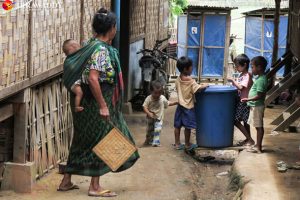Five Years Since Fighting Renewed in Kachin State and Still No Relief in Sight
By Burma Partnership • June 15, 2016 On 9 June, 2016, 130 global solidarity groups banded together to draw attention to the fifth anniversary of renewed armed conflict in Kachin State and the end of a 17-year ceasefire between the Burma Army and the Kachin Independence Army (KIA). As outlined in their statement, the Burma Army has committed severe human rights abuses during the conflict – in certain cases constituting war crimes under international law – including extrajudicial killings, torture, forced labor, sexual violence, arbitrary detention, attacks on civilians and the pillaging of property. Despite overwhelming evidence of these abuses, the Burma Army has benefited from almost complete impunity from prosecution.
On 9 June, 2016, 130 global solidarity groups banded together to draw attention to the fifth anniversary of renewed armed conflict in Kachin State and the end of a 17-year ceasefire between the Burma Army and the Kachin Independence Army (KIA). As outlined in their statement, the Burma Army has committed severe human rights abuses during the conflict – in certain cases constituting war crimes under international law – including extrajudicial killings, torture, forced labor, sexual violence, arbitrary detention, attacks on civilians and the pillaging of property. Despite overwhelming evidence of these abuses, the Burma Army has benefited from almost complete impunity from prosecution.
A number of high profile cases in Kachin State shed light on the extent of human rights abuses and the lack of recourse for victims. As of this month, the Burma Army continues to avoid cooperation with an investigation into the rape and murder of two Kachin teachers in January 2015, who had been working in northern Shan State. The leading investigators, the Kachin Baptist Church, have complained that the Burma Army is disrupting their inquiry into the crime by ignoring requests for meetings with officers present during the attack, as well as prohibiting the direct questioning of army officers.
In November 2015, the Burma Army detained two ethnic Shan civilians that were traveling through Kachin State, believing them to be members of the KIA. The Civilian Protection Monitoring Group has reported that the two civilians were tortured all night, before being released to a local police unit the next day. Recently, attention has been drawn to Laphai Gam, a farmer from Kachin State who was arrested in 2012 and subjected to brutal torture at the hands of the Burma Army. In 2013, the UN Working Group on Arbitrary Detention found that the farmer had been forced to commit sexual acts on another accused civilian during his interrogation. The Working Group determined that, “such pervasive use of torture to extract evidence nullifies the possibility to fulfill the guarantee of the right to a fair trial.” Despite a United Nations ruling declaring that Laphai Gam’s imprisonment is unlawful, he continues to be detained to this date.
The statement from the 130 solidarity groups also raises concern over the more than 100,000 civilians who have been displaced since 2011 as a result of the conflict in Kachin State. The European Commission for Humanitarian Aid and Civil Protection has noted those displaced from the conflict have relocated to 150 camps, half of which are situated in non-government controlled areas. In many of these regions, the Burma Army, under the oversight of former Thein Sein Government, actively blocked humanitarian aid. Worsening the crisis, humanitarian assistance from the United Nations and other relief agencies has reportedly been scaled back. Since January 2016, internally displaced persons (IDPs) in Kachin State have apparently only been granted a daily stipend of 300 Kyats ($US.25), a miniscule amount to buy food and survive upon. Even if conflict eventually is to end in Kachin State, widespread land confiscations by the Burma Army suggest that many IDPs will be forced to relocate their homes.
Meanwhile, the Burma Army continues to exacerbate conflict in Shan and Arakan States. According to the World Food Program, 172,000 IDPs displaced by conflict in Shan, Arakan and Kachin States are in dire need of humanitarian aid. The state of conflict and scale of internal displacement in Burma should therefore motivate the NLD-led Government to address this issue immediately. Military offensives in Kachin State, along with other regions in Burma, must end and humanitarian support must be allowed free access to IDPs. Further, as an important stepping-stone to a lasting peace, the Burma Army should be held accountable for the human rights abuses it has committed with near impunity. For the peace process to be successful and beneficial to the communities and people on the ground the NLD-led Government needs to demonstrate inclusivity by ensuring remaining ethnic armed organizations who are not yet signatories to the so-called Nationwide Ceasefire Agreement, such as the KIA, are brought into negotiations.
Tags: Arakan State, Burma Partnership, Human Rights Violations, Humanitarian Aid, IDPs, Kachin State, National League for Democracy (NLD), Shan State, World Food ProgrammeThis post is in: Blog
Related PostsU.S.: Lifting Sanctions on Myanmar Puts Human Rights Progress At Risk
Advisory Commission on Rakhine State – A Welcome Investigation into Arakan State’s Human Rights and Humanitarian Crisis
NLD Government Must Lift All Aid Restrictions in Arakan State
United States Commission on International Religious Freedom – Burma: 2016 Annual Report
(၂၉) ႏွစ္ေျမာက္ စစ္ေတြဆန္ျပႆနာေန႔ ဝမ္းနည္းေအာက္ေမ့ဖြယ္ အထိမ္းအမွတ္ သေဘာထားထုတ္ျပန္ခ်က္









 All posts
All posts